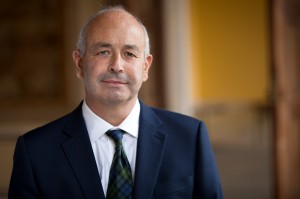The boss of the South West’s largest business group has urged firms to ‘stay positive’ this year in the face of huge challenges.
Phil Smith, managing director of Business West – which runs Bath Chamber of Commerce – also said companies could benefit in 2023 by being based in an innovative region at the forefront of the drive for sustainable growth. 
“My message to firms over the coming year would simply be, stay positive because your country needs you,” he said in his New Year message.
“Our region, with its natural assets, talent, technical expertise and culture of innovation is at the vanguard of the future focus on sustainable growth and between the headwinds lie strong opportunities.”
This included the use of hydrogen as an alternative, green power source – a sector with huge potential and one in which the region was already a trailblazer.
Over the past few years South West firms had been faced with the outbreak of the pandemic followed closely by the end of the Brexit transition period, said Mr Smith, pictured, only then to be hit with record inflation levels and decreasing consumer and market confidence as the cost of living crisis deepened and a recession loomed.
“But the past 12 months have also been filled with strong achievements in business, something which can often be forgotten amid the turbulence,” he added.
“And as the saying goes, ‘If you are positive, you’ll see opportunities instead of obstacles’.
“We need to keep in mind that wealth creation, which only business can do, is the basic building block for any sustainable, inclusive and successful society. 
“We believe the South West, with its unique natural assets, has a great opportunity to be a leader in the green and blue economies.”
Hydrogen South West, a partnership that includes Bristol Airport, aerospace giants Airbus and GKN, airline easyJet and building group Costain, was launched last year to investigate bringing the benefits of hydrogen to the region.
Hydrogen, along with other sources such as offshore wind and solar, would be crucial in easing dependence on carbon heavy fossil fuels while reducing energy costs, he said.
“It’s clear that we must now marry economic growth with climate action. We’ve found that knowledge about ‘what to do’ is the biggest barrier for companies, so in the past year we’ve supported hundreds of businesses to make environmental changes via knowledge and information sharing through our workshops.” 
Business West will this year host a series of events and launch, as part of Hydrogen South West, a hydrogen membership that will equip firms with the skills to utilise this new pioneering form of renewable energy.
“This focus on home-grown renewables was fuelled by key events in 2022 such as temperatures reaching record levels during the summer months, but also our desire to reduce dependence on other countries for our energy,” Mr Smith said.
Business West was certified as a B Corporation in October 2021, joining an elite, forward-looking global community that balances profit with people and the planet.
“As a B Corp business, our priority, as well as practising what we preach, is to help businesses to take small, practical steps to tackle climate change and prevent further damage to the planet,” said Mr Smith.
In the skills arena, 2022 had ushered in immense challenges for firms, with job vacancies reaching record highs. Business West’s most recent quarterly economic survey revealed that 77% of firms had experienced recruitment difficulties in the past quarter – an increase of 5% over the year.
“Our business communities need talented people and they’re not coming through,” Mr Smith said. “Our job is to try and help employers find their way through the maze of schemes and offers and get access to the right people.
“To help address this, the Local Skills Improvement Plans (LSIPs) were launched this year, which Business West is delivering across the West of England, Swindon and Wiltshire and Gloucestershire. “This involves bringing together employers to help inform funders and local training providers as to the key priorities and changes needed in the area to ensure skills gaps are being addressed.”
In international trade, delayed orders, extra costly bureaucracy and supply chain issues were some of the real impacts businesses were facing in the overhang of Brexit and the pandemic. However, the South West was increasingly recognised as a great place to invest and do business at a national and international level,
“We are hearing from an increasing number of businesses that their exports are thriving and our export documentation team are processing a rising number of documents, showing the sustained demand for business abroad,” Mr Smith said.
“Despite a challenging year, enough good has happened in 2022 to leave me feeling optimistic about the year ahead.
“But there are key things the government needs to deliver for our businesses. We need to build further on the devolution of power and resources out of Westminster and into local hands, but in turn we need to ensure that this local governance is fit for purpose too.
“My wish at the start of last year was for government to stop treating private sector businesses as a milch cow to support an ever-growing public sector.
“If anything, the situation worsened with increasing taxation on business, while in parallel, we saw an undermining of our basic public infrastructure.
“While we have recovered, in recent months, some stability in government, the damage to credibility through the markets has stymied business investment.”
The government now needed to create an economic climate and working public infrastructure that encouraged business investment to achieve longer-term growth – whether through fewer taxes, more R&D credits or relaxations and/or streamlining of business-sapping regulations.



















